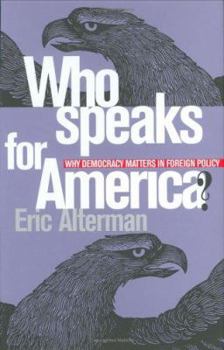Who Speaks for America?: The Author in the Autograph
A book in current affairs by a columnist for The Nation whose first book sold some 30,000 copies. The new book continues the work the author began in Sound and Fury: The Washington Punditocracy and the Collapse of American Politics (Harper-Collins, 1992). Alterman says that elites dominate U.S. foreign policy at every turn, and that the gap between the views of the public and those of the policy-making elites has increased to the extent that the United States has become an empire.Journalist and historian Eric Alterman argues that the vast majority of Americans have virtually no voice in the conduct of U.S. foreign policy. With policymakers answerable only to a small coterie of self-appointed experts, corporate lobbyists, self-interested parties, and the elite media, the U.S. foreign policy operates not as the instrument of a democracy, but of a "pseudo-democracy": a political system with the trappings of democratic checks and balances but with little of their content. This failure of American democracy is all the more troubling, Alterman charges, now that the Cold War is over and the era of global capital has replaced it. Americans' stake in so-called foreign policy issues from trade to global warming is greater than ever. Yet the current system serves to mute their voices and ignore their concerns. Experts have long insisted that the public is too ignorant to contribute to the creation of successful foreign policy. But over the course of two hundred years, as Alterman makes clear, the American people have shown an impressive consistency in their ideals and values. The problem for any elite, the author explains, is that Americans often define their interests quite differently than those who would speak in their name. The American public's values are, ironically, much closer to the "liberal republican" philosophy of our founders than to those of our most powerful elites. Alterman concludes with a series of challenging proposals for reforms designed to create a truly democratic U.S. foreign policy.
Format:Hardcover
Language:English
ISBN:0801435749
ISBN13:9780801435744
Release Date:January 1998
Publisher:Cornell University Press
Length:244 Pages
Weight:1.15 lbs.
Dimensions:0.9" x 6.3" x 9.3"
Customer Reviews
2 ratings
Compelling case for a democratic foreign policy
Published by Thriftbooks.com User , 16 years ago
Eric Alterman is a rare journalist who actually believes in a democratic foreign policy. Yes, it is depressing that this thesis is even controversial, but it unfortunately is. Alterman makes an eloquent case for more public participation in the nation's foreign policy. To prove his contention that leading intellectuals are anti-democratic, Alterman quotes one think tank policy "expert" who flat-out says, "I don't think the people should have any voice in foreign policy," (he does not unfortunately name the elitist). Alterman demonstrates that the elite consensus is wrong; popular opinion on foreign policy is neither irrational nor constantly shifting. Best of all, Alterman is intellectually honest. A supporter of high levels of immigration, he nonetheless honest enough to admit that the American people want immigration greatly reduced. (This fact has been supported by numerous opinion polls conducted by the Chicago Council of Foreign Relations).He challenges pro-immigration advocates to make a better case for their position to the American people. I highly recommend Who Speaks for America.
History Lessons
Published by Thriftbooks.com User , 23 years ago
As a non-US citizen, this eye-opening book is a challenge. Intricate, with massive information and intense analysis, the book is a must to understand how US foreign policy evolved and revolved around similar interventionist attitudes. History tells, according to Alterman, how it can repeat itself with the help of US officials. Rewritten history as in the Orwellian 1984 is the means by which the most antidemocratic facets of US state policies are set into place. I learned about this book in a C-Span 2 panel and Alterman's words did not disappointed me a bit.






